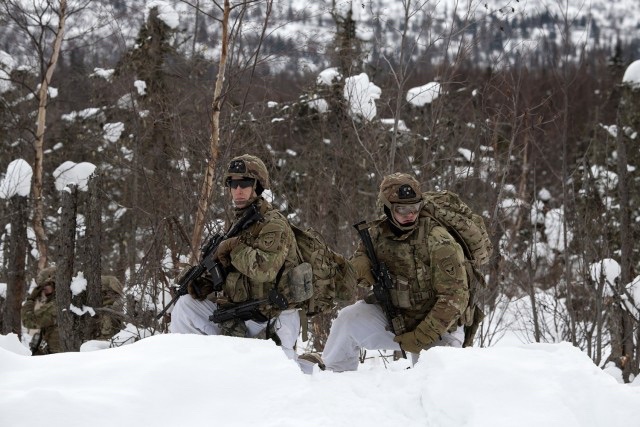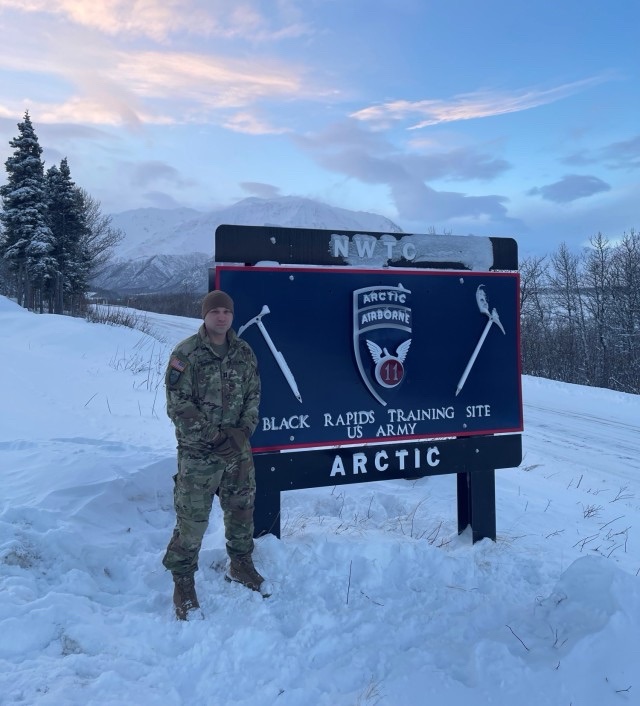
FORT LEAVENWORTH, Kan. — The U.S. Army has begun development on the first Arctic-focused doctrine in more than 50 years, Army Techniques Publication 3-90.96, Arctic and Extreme Cold Weather Operations. The manual, slated for release in mid-2024, will provide Soldiers and leaders with the knowledge and techniques necessary to overcome the Arctic environment and succeed in temperatures as cold as minus 40 degrees Fahrenheit.
“Arctic and extreme cold weather operations are about more than being able to survive, you have to be able to thrive,” said Capt. Edward A. Garibay, the lead doctrine author for the publication with the Combined Arms Doctrine Directorate. “As the Arctic warms from climate change, it’s going to become more and more accessible in the coming decades and take on new importance. We have to be ready to accomplish the mission in such an environment. This doctrine will help our Soldiers do that.”
The publication will be tactically focused and will help Soldiers use the concepts and experience they already know and adapt them for the Arctic and Subarctic. It will explain many of the unique and sometimes counterintuitive aspects of the region and the considerations Soldiers must take to adjust operations. For instance, the sun may never rise during the month of December; GPS and satellites can be unreliable due to solar storms; metals and plastics become brittle and can break; and batteries have significantly shorter life.
“One of the problems we face now is that we have a lot of localized knowledge that isn’t easily shared across the Army,” said Garibay. “We have pockets of individuals and units that are experts, but their knowledge is only available in local [standard operating procedures] and only passed down from one command to the next. We’re consolidating all that knowledge in one place and providing a foundation for everyone to build on.”
The CADD Special Doctrine Division, the doctrinal proponent for cold weather, has been extensively researching Arctic and extreme cold weather operations for more than a year. Their efforts include training at the Northern Warfare Training Center, referencing historical records, and consultation with other Arctic nations such as Canada, Norway, Finland, Sweden and Denmark. One of their primary resources is the 11th Airborne Division in Alaska, which has played a critical role in developing doctrine. According to Garibay, their continued innovation and expertise has been invaluable. They have taken an active role in writing Arctic doctrine, staffing revisions, and providing subject matter experts.

“The U.S. Army has to be ready to fight and win in extreme cold and mountainous environments in order to deter conflict, and the 11th Airborne Division is the foundation of that capability,” said Maj. Gen. Brian Eifler, commander, 11th Airborne Division. “To build sustained Arctic readiness, we need to follow the example of Alaska native communities who have thrived here successfully for millennia, sharing best practices and lessons learned.”
Another milestone in the doctrine’s development will occur during the 11th Airborne Division’s upcoming Joint Pacific Multinational Readiness Center exercise this winter. During the exercise, which will replicate large-scale combat conditions, the division will also be validating concepts for the doctrine and providing immediate feedback to CADD.
To learn more about Army doctrine and access doctrinal resources, visit the CADD public website.
By Combined Arms Doctrine Directorate staff


Climate change. Oh boy. #muhscience
Will the ATP make an exception to policy and let that poor Captain in the picture put his hands in his pockets?
Sounds like a waste of money to prepare for -40 temperatures if the Arctic is warming more every year and soon to be a tropical paradise.
It can also cause more harsher winters, that I think we’ve seen in recent years all over the planet while still having overall warmer weather. But then again it might just be planet being planet, but I tend to believe people screwing things up.
I really hope that they are taking that “review historical records” thing seriously. That, and all the decades of AAR’s, expensive R&D, documented experience, actual scientific study, and long forgotten FM’s and TM’s. There is entirely too much re-inventing of wheels in the Army.